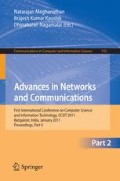Abstract
The incoerciblety to prevent rigging in e-voting and e-auction have been studied in different literatures. It is realized that the notion of a virtual booth and untappable channel are required to prevent coerciveness. Virtual booth protects the candidates to cast their private values without being observed by the adversary/coercer. However the adversary can influence the candidates after their casting. Adversary used to acquire the encrypted votes/bids either from the colluded authorities (voting server, auctioneer) or by eavesdropping the communicating channel. The adversary then coerces the candidates to disclose their private values with their private keys and verifies whether the ciphers are the encryption of the private values. In the prior literatures of e-voting and e-auctioning, threshold-encryption and receipt-free mechanism are used to prevent the coercion and collusion respectively. But they assumed untappable channel to restrict eavesdropping. However, untappable channel is difficult to achieve. It should be a dedicated trusted link or continuous fiber link to implement untappable channel. In this paper we present an alternative of untappable channel using deniable encryption. Deniable encryption does not restrict the adversary to eavesdrop, but if the candidates are coerced, they are able to find a different value v f and can convince the adversary that the ciphers are the encryption of v f , without reveling the true private value v r . Therefore, eavesdropping does not help the coercer, as he may be plausible denied by the candidates. Our scheme is based on public key probabilistic encryption mechanism. We assume that the sender side (candidate) coercion is only possible, that is, the coercer can not coerce the receivers (authorities).
Access this chapter
Tax calculation will be finalised at checkout
Purchases are for personal use only
Preview
Unable to display preview. Download preview PDF.
References
Benaloh, J., Tuinstra, D.: Receipt-Free Secter-Ballot Election (Extended Abstract). In: Proc. 26th ACM Symposium on the Theory of Computing (STOC), pp. 544–553. ACM, New York (1994)
Hirt, M., Sako, K.: Efficient Receipt-Free Voting Based on Homomorphic Encryption. In: Preneel, B. (ed.) EUROCRYPT 2000. LNCS, vol. 1807, pp. 539–556. Springer, Heidelberg (2000)
Okamoto, T.: Receipt-Free Electronic Voting Schemes for Large Scale Elections. In: Cluet, S., Hull, R. (eds.) DBPL 1997. LNCS, vol. 1369, pp. 25–35. Springer, Heidelberg (1998)
Franklin, M.L., Reiter, M.K.: The Design and Implementation of a Secure Auction Service. IEEE Trans. Software Engineering 2, 302–312 (1996)
Abe, M., Suzuki, K.: Receipt-Free Sealed-Bid Auction. In: Chan, A.H., Gligor, V.D. (eds.) ISC 2002. LNCS, vol. 2433, pp. 191–199. Springer, Heidelberg (2002)
Abe, M.: Universally Verifiable Mix-Net with Verification Work Independent of the Number of Mix-Servers. In: Nyberg, K. (ed.) EUROCRYPT 1998. LNCS, vol. 1403, pp. 437–447. Springer, Heidelberg (1998)
Markus, M., Patrick, H.: Some Remarks on a Receipt-Free and Universally Verifiable Mix-Type Voting Scheme. In: Kim, K.-c., Matsumoto, T. (eds.) ASIACRYPT 1996. LNCS, vol. 1163, pp. 125–132. Springer, Heidelberg (1996)
Baudron, O., Fouque, P.-A., Pointcheval, D., Stern, J., Poupard, G.: Practical Multi-Candidate Election System. In: Proc. PODC 2001, 20th Annual ACM Symposium on Principles of Distributed Computing, pp. 274–283. ACM, New York (2001)
Yvo, D.: Threshold Cryptography. Trans. on European Transaction on Telecommunications 5(4), 449–457
Shamir, A.: How to Share a Secret. Trans. on Commun. ACM 22(11), 612–613 (1979)
Pedersen, T.P.: A Threshold Cryptosystem without a Trusted Party (Extended Abstract). In: Davies, D.W. (ed.) EUROCRYPT 1991. LNCS, vol. 547, pp. 522–526. Springer, Heidelberg (1991)
Sako, K.: An Auction Protocol Which Hides Bids of Losers. In: Imai, H., Zheng, Y. (eds.) PKC 2000. LNCS, vol. 1751, pp. 422–432. Springer, Heidelberg (2000)
Chen, X., Lee, B., Kim, K.: Receipt-Free Electronic Auction Scheme using Homorphic Encryption. In: Lim, J.-I., Lee, D.-H. (eds.) ICISC 2003. LNCS, vol. 2971, pp. 259–273. Springer, Heidelberg (2004)
Burmester, M., Magkos, E., Chrissikopoulos, V.: Uncoercible e-Bidding Games. Trans. Electronic Commerce Research 4(1-2), 113–125 (2004)
Sako, K., Kilian, J.: Receipt-Free Mix-Type Voting Scheme - A Practical Solution to the Implementation of a Voting Booth. In: Guillou, L.C., Quisquater, J.-J. (eds.) EUROCRYPT 1995. LNCS, vol. 921, pp. 393–403. Springer, Heidelberg (1995)
Howlader, J., Ghosh, A., Roy, T.D.: Secure Receipt-Free Sealed-Bid Electronic Auction. In: Proc. IC3 2009. CCIS, vol. 40. Springer, Heidelberg (2009)
Canetti, R., Dwork, C., Naor, M., Ostrovsky, R.: Deniable Encryption. In: Kaliski Jr., B.S. (ed.) CRYPTO 1997. LNCS, vol. 1294, pp. 90–104. Springer, Heidelberg (1997)
Goldwasser, S., Micali, S.: Probabilistic Encryption. Trans. on Journal of Computer and System Sciences 28, 270–299 (1984)
Ibrahim, M.H.: A Method for Obtaining Deniable Public-Key Encryption. Trans. on International Journal of Network Security (IJNS) 8(1), 1–9 (2009)
Magkos, E., Burmester, M., Chrissikopoulos, V.: Receipt-Freeness in Large-Scale Elections without Untappable Channels. In: Proc. 1st IFIP Conference on E-Commerce, E-Business, E-Government 2001, IFIP Conference Proceedings, vol. 202, pp. 683–694 (2001)
Lee, B., Kim, K.: Receipt-Free Electronic Voting Scheme with a Tamper-Resistant Randomizer. In: Lee, P.J., Lim, C.H. (eds.) ICISC 2002. LNCS, vol. 2587, pp. 389–406. Springer, Heidelberg (2003)
Howlader, J., Basu, S.: Sender-Side Public Key Deniable Encryption Scheme. In: Proc. ARTCom 2009, pp. 9–13. IEEE, Los Alamitos (2009)
Menezes, A.J., van Oorschot, P.C., Vanstone, S.A.: Handbook of Applied Cryptography. CRC Press, Boca Raton (1996) ISBN 0849385237
Author information
Authors and Affiliations
Editor information
Editors and Affiliations
Rights and permissions
Copyright information
© 2011 Springer-Verlag Berlin Heidelberg
About this paper
Cite this paper
Howlader, J., Nair, V., Basu, S. (2011). Deniable Encryption in Replacement of Untappable Channel to Prevent Coercion. In: Meghanathan, N., Kaushik, B.K., Nagamalai, D. (eds) Advances in Networks and Communications. CCSIT 2011. Communications in Computer and Information Science, vol 132. Springer, Berlin, Heidelberg. https://doi.org/10.1007/978-3-642-17878-8_50
Download citation
DOI: https://doi.org/10.1007/978-3-642-17878-8_50
Publisher Name: Springer, Berlin, Heidelberg
Print ISBN: 978-3-642-17877-1
Online ISBN: 978-3-642-17878-8
eBook Packages: Computer ScienceComputer Science (R0)

